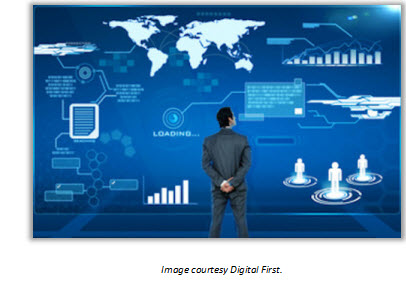By Carolyn Dolezal, Executive Vice President and Chief Executive, Technology Industry Practice SmithBucklin
We are entering a new era, which requires us to refine our ice-breaker questions. Many of us have developed a go-to list of ice-breaker questions when attending networking events, conferences, cocktail parties, and holiday gatherings. These questions allow us to cast a broad enough conversational net so we can snag a response and start a dialogue.
At a recent Dreaming Session discussing the future of work, I overheard just such a discussion. The question asked of a millennial attendee was “where do you work?”
Even five years ago, that question used to generate a fairly standard response such as “I work for (Name of Company) in their (Location) office as a (Title).” In a traditional work arrangement, there is a specific place that’s considered “the workplace.” There is an office building with a specific work area designated for the employee, and most members of the team are co-located in the area where the work gets done.
In the ice-breaker session I observed, when asked, “Where do you work?” the respondent paused for a second before replying. He is an entrepreneur with his team of three scattered across two continents. His colleagues are friends from college and they continue to work together on emerging technologies. He responded to the question in terms of his local (home) office, then quickly shifted to enthusiastically describing their current major project.

In today’s world of work, we see more distributed teams who “meet” in virtual conference rooms, hosting conference calls spanning multiple time zones. Employees may come to the physical office on designated days to an assigned office, or share hoteling work space. Employees telecommute; working from a home office, from a variety of destinations on the road, or perhaps in shared office space at a supplier or customer location because that proximity is important to get work done.
Some participants in the Dreaming Session indicated they preferred the office setting, because of the more comfortable environment, better infrastructure and information access, and opportunity to meet with colleagues without the distractions and interruptions experienced in other (home) settings. Other participants had a strong preference for a virtual office because the nature of their work, the location of their team members and travel schedules required a fluid environment. “I am the workplace” said one participant, reflecting the true nature of how his knowledge work gets done.
The Dreaming Session was an eye-opener. It encouraged broad thinking on the topic of “where do you work?” to include “how do you want to work?” What does that answer look like for you?
———––
The content shared in this blog post is the author’s opinion and does not necessarily reflect the views of Xerox. Carolyn Dolezal is Executive Vice President and Chief Executive, Technology Industry Practice and participated in the Xerox Future of Work Dreaming Session in June 2012.


With the new era of “working from home” taking a strong foothold, this becomes a very relevant question. While the bottom line needs take front stage importance, the reality is that not every role is conducive to that arrangement. It really depends on the person and management to determine whether it is practical and does not compromise on the difficult to quantify collaborative benefits of team members working in a central location. At the end of the day, the question has to be: Does it make “business” sense?
Regarding the “how”, it becomes a related question. Depends on the work itself, and what it entails – does it make sense to allow work best accomplished by teams be the sole responsibility for an individual contributor, and vice versa.
Love this! I used to think a question like this was an open-ended “hook” that would engage any new contact in dialogue, but you’re so right. Without a deeper understanding of a new contact, this question can polarize vs. engage.
Thinking of the many people in transition at networking events, I’ve also banished the “what do you do?” question. Alternate questions that have helped me build rapport without context include: “What’s keeping you busy these days?” “On what industries are you focused?” “Do you think workplaces should support bringing our own devices for work (and are you a Mac, PC or ‘other’ user if you had the choice)?”
In the end, the success of any ice breaker question has as much to do with our sincere interest in learning about the person with whom we’re speaking as the words we choose, and a warm smile will support our efforts to build rapport when the conversation doesn’t flow as we hope.
Mary, I agree with your comments. In a world where more teams and more interactions are “virtual”, I am exploring how can you really connect and build rapport quickly and well. People are social animals–the interface is changing.
Hi Murad– I love the discussion on what makes business sense– many cases are cut and dried. After that, it is often in the eye of the beholder. I find that if you have worked with people “live” it is easier to have the team work virtually. I also find it interesting that some people feel it is unfair to allow some team members work virtually and yet may never ask for or seek that privilege themselves.
What an interesting thread! When I worked in sales I was constantly taught to answer “what do you do” or “where do you work” with this pitch-filled rhetoric about my company’s solutions. Now I work at an ecommerce company called Shari’s Berries which is owned by a parent brand which is a owned by a holding company and as a result I still always feel like my answer is convoluted! The business case is less relevant to my answer now, but the first impression is still just as important.